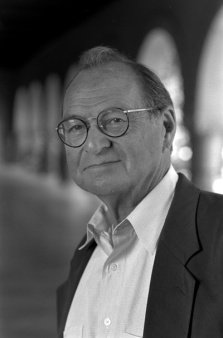The Situationist brings the sad news: Psychologist Robert Zajonc died on December 3. (It’s a repost of a story by Adam Gorlick from Stanford News Service.)
Zajonc wasn’t a household name (I didn’t even know it rhymes with “science”), but his research was.
Plus, he led a stunning, dramatic and sometimes wonderful life, surviving horrors in the Holocaust and contributing great things to science.
Gorlick’ s memorial may be best read there, and I encourage you to click over there to read it.
Several of Zajonc’s articles are listed as “Classics” at Science Magazine, including his 1981 defense of research spending, in the first year of the Reagan administration.
I also urge you to consider what teachers might do with some of Zajonc’s findings, things that propagandists and dastardly politicians (and a few nice politicians) have already used:
- People like images they see over and over, the “mere exposure” effect (It’s important what pictures you post in your classroom, yes?)
- Parental contact with older children can raise their IQs — well, parental contact does raise the IQs of older children, but having less time for younger children tends to keep the younger kids’ IQs from developing as much. (Did you read to your youngest kid last night?)
- Challenging kids to tell why things work the way they claim makes them smarter. (This was the same research: The younger kids’ challenging the older kids made the older kids smarter. Heck, their challenging of the parents probably make the parents smarter, too. Do we make students defend their views to other students?)
- Facial expression affects emotions (”Emotions and Facial Expression,” Zajonc, Science 8 November 1985: 608-687; DOI: 10.1126/science.230.4726.608-b)
- People who perform tasks well, perform them even better in front of an audience.
- People who perform an unknown task before an audience tend to make more mistakes than they would if they practiced it in private.
Some of Professor Zajonc’s most influential work concerned “social facilitation” — the effect of the presence of others on a person’s performance of a specific task. Previous research on the subject appeared contradictory, suggesting that spectators helped performers in some cases but not in others. But in which cases?
What Professor Zajonc found was that when performers have mastered a skill at a high level, they are helped by the presence of an audience. (Think of professional musicians or athletes.) But he also found that when a performer has mastered a skill only imperfectly, the existence of onlookers is a hindrance. (Think of Sunday duffers in any arena.)
Elsewhere in his work, Professor Zajonc explored the nexus between psychology and physiology. In one widely reported study, he found that smiling or frowning can alter blood flow to the brain as facial muscles relax or contract. This in turn affects the parts of the brain that regulate feelings, helping induce happy or sad emotional states.
And do you ever wonder about why old couples tend to resemble each other so much? Zajonc worked that out, too.
Why didn’t he get a Presidential Medal of Freedom?
Resources:
- Stanford News Service story
- New York Times obituary
- “Long married couples do look alike,” 1987 New York Times story on Zajonc’s research
- Zajonc’s research used to explain sales of soap that looks like other objects
- “A feel good theory: A smile affects mood,” 1989 report on Zajonc’s work
- “Study on IQ prompts debate on family dynamics,” 2007 report on controversy
- Science Magazine discussion on birth order and intelligence (without Zajonc)
- Profile at Social Psychology.org
- 2003 tribute to Robert Zajonc in Budapest, Hungary, by Mahzarin R. Banaji, Harvard University
Cross-posted from Millard Fillmore’s Bathtub with permission.


These are great references of my father’s work. Were collecting more at the Facebook group page Robert B Zajonc. Have a look! And please feel free to contribute in any way. Thanks. -Peter
By: Peter Zajonc on February 8, 2009
at 6:30 pm